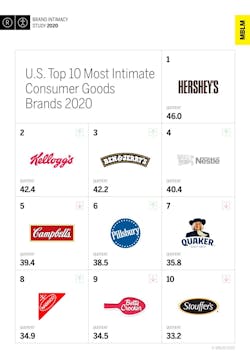
Editor's note: Consumer goods brands are among the top industries that consumers bond with and nostalgia is a significant component of that relationship between product and consumer, branding agency MBLM found in a recent study.
Consumer Goods Ranked in the Top Third in MBLM's Brand Intimacy 2020 Study; Industry Provides Comfort to Consumers During Pandemic
NEW YORK, May 20, 2020 /PRNewswire/ -- The consumer goods industry ranked fifth out of 15 industries studied in MBLM's Brand Intimacy 2020 Study, which is the largest study of brands based on emotions. With our increased reliance on grocery shopping due to quarantine measures, the industry is playing a vital role during the pandemic. Brands are also offering consumers comfort and some of the biggest are donating supplies and funds. MBLM (pronounced Emblem), the agency using emotional science to build more intimate brands during these unprecedented times, is analyzing the Brand Intimacy profile of the industry and how consumers are relating to these brands today. Brand Intimacy is defined as the emotional science that measures the bonds we form with the brands we use and love, and is more important than ever as brands need to modify their roles.
MBLM's study, now in its 10th year, revealed that Hershey's ranked #1 in the consumer goods industry followed by Kellogg's and Ben & Jerry's. The remaining brands in the top 10 for the industry were: Nestlé, Campbell's, Pillsbury, Quaker, Nabisco, Betty Crocker and Stouffer's. Top intimate brands in the U.S. continued to significantly outperform the top brands in the Fortune 500 and S&P indices in both revenue and profit over the past 10 years, according to the study.
Packaged food brands such as Oreo's and Campbell's Soup are seeing increased sales during the COVID-19 pandemic.1 Some brands in the industry are also focused on social initiatives, giving back and helping others. For example, Hershey's collaborated with DC Comics to create new Super Hero Milk Chocolate bars, which it is donating to front-line workers to thank them; the company has also donated millions of dollars to help community safety programs as well as other healthcare organizations.2 Kellogg's has donated over $10 million in food and funds to help curb hunger due to the pandemic.3
"The nostalgic strength of consumer goods brands – the only industry in our study where nostalgia is the dominant archetype – is playing a large role in helping people cope during the COVID-19 crisis. Consumers are taking solace in the foods of their childhood, which are bringing them back to the positive memories of their past. As entertainment binging continues with people at home, snacks are also becoming a part of the experience," stated Mario Natarelli, managing partner, MBLM. "By focusing on the relief they are offering and reliability of these products, we believe that consumer goods brands can continue to build upon the strong emotional connections they have formed in recent months to strengthen their bonds with consumers post-pandemic."
Additional significant consumer goods industry findings in the U.S. include:
- The industry had an average Brand Intimacy Quotient of 37.5, which is above the cross-industry average of 31
- Hershey's was the #1 brand in the category and had broad appeal. Consumers with incomes both over and under $100,000 ranked Hershey's as their favorite intimate brand
- Hershey's was also the top consumer goods brand among women and consumers over 35 years old
- Men ranked Kellogg's as their top intimate brand and millennials preferred Ben and Jerry's
- Nostalgia, which is related to memories and the feelings associated with them, was the most prominent archetype in the category, and Hershey's was the top consumer goods brand for nostalgia
MBLM also examined the industry in an article entitled, "The Power of Nostalgia: How consumer goods are providing comfort and relief during these trying times." It analyzes how the consumer goods industry performed in the study prior to the pandemic and how recent circumstances and our increased reliance on grocery stores have made the brands in the industry more essential. The article also discusses how consumers are turning to social media to share their favorite treats or new recipes for coping.
The Brand Intimacy 2020 Report contains the most comprehensive rankings of brands based on emotion, analyzing the responses of 6,200 consumers and 56,000 brand evaluations across 15 industries in the U.S., Mexico and UAE. MBLM's reports and rankings tool showcase the performance of almost 400 brands, revealing the characteristics and intensity of the consumer bonds.
To view the consumer goods industry findings, please click here. Additionally, MBLM offers Custom Dashboards providing extensive data for brands included in its annual Brand Intimacy Study. To download the full Brand Intimacy 2020 Study or explore the Rankings click here.
Methodology
During 2019, MBLM with Praxis Research Partners conducted an online quantitative survey among 6,200 consumers in the U.S. (3,000), Mexico (2,000), and the United Arab Emirates (1,200). Participants were respondents who were screened for age (18 to 64 years of age) and annual household income ($35,000 or more) in the U.S. and socioeconomic levels in Mexico and the UAE (A, B and C socioeconomic levels). Quotas were established to ensure that the sample mirrored census data for age, gender, income/socioeconomic level, and region. The survey was designed primarily to understand the extent to which consumers have relationships with brands and the strength of those relationships from fairly detached to highly intimate. It is important to note that this research provides more than a mere ranking of brand performance and was specifically designed to provide prescriptive guidance to marketers. We modeled data from over 6,200 interviews and approximately 56,000 brand evaluations to quantify the mechanisms that drive intimacy. Through factor analysis, structural equation modeling, and other sophisticated analytic techniques, the research allows marketers to better understand which levers need to be pulled to build intimacy between their brand and consumers. Thus, marketers will understand not only where their brand falls in the hierarchy of performance but also how to strengthen performance in the future.
To read a more detailed description of MBLM's approach, visit its Methodology page.
About MBLM: MBLM has invented a new marketing paradigm, Brand Intimacy, delivering expertise and offerings across three areas of focus: Agency, Lab and Platform. With offices in seven countries, our multidisciplinary teams help clients build stronger bonds and deliver optimized marketing outcomes and returns for the long term. To learn more about how we can help you create and sustain ultimate brand relationships, visit mblm.com.
2 Hershey Donates Milk Chocolate Super Hero Bars to Front-Line Workers
3 Kellogg Donates Over $10 Million to COVID-19 Hunger Relief





